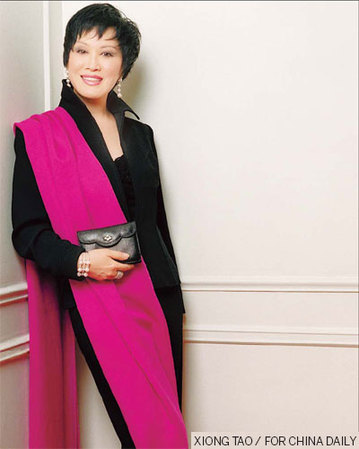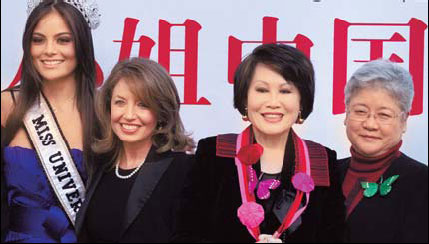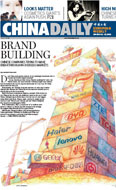People
A face that says it all
Updated: 2011-03-08 07:56
By Liu Wei (China Daily)
|
Yue-sai Kan with (from left) Ximena Navartt, the current holder of the Miss Universe 2010 crown, Paula Shugart, president of the Miss Universe Organization, and Tang Wensheng, vice-chairperson of China Soong Ching Ling Foundation. Jiang Dong / China Daily |
Yesteryear It girl Yue-sai Kan was to tens of millions of Chinese women 30 years ago what Sienna Miller and Alexa Chung (both English models) are to today's 20-something Internet enthusiasts. Dubbed "the most famous woman in China" by People Magazine, Kan rose to stardom with the TV show One World, in 1986. The show took Chinese viewers, starved for information about the outside world, to the United States, Egypt, Australia and Greece, and told them stories about baseball, New York's immigrants, and the state of women's rights in Denmark.
Kan dazzled. At a time when China was just opening up, she was so in vogue.
Her hairstyle, the Dutch bob, was called "Yue-sai cut" and every hair salon at that time made sure it could offer it.
Her vivid red lips and dark black hair, garnered her millions of fans, who became the first customers of her cosmetic line YUE SAI, that she opened in 1992. Many Chinese women made their first forays into make-up with YUE SAI lipstick.
 |
At 62, she remains a picture of elegance in her impeccable make-up and delicate jewelry. Not a wrinkle can be seen in her perfectly fitting black suit and flared trousers, decorated with rose ribbons.
Our interview, after a press conference to announce her selection as national director of Miss Universe China in 2011, is frequently interrupted by her three assistants shuffling in and out with a host of requests. But Kan remains unperturbed. A woman stands by until we finish, just to take a picture with her.
While it seems only natural that Kan should take over the job of preparing the Chinese contestants for beauty's biggest pageant, Kan is at pains to point out that she is driven by disappointment over the previous contestants.
"This is (about) our image," she says. "How can we have a Miss China who does not represent the best in us?"
By mid-June she will have picked 30 women from around the country to put them through the paces with a team that includes trainers of former Miss Universe wannabes.
The hopefuls, selected from online applicants, will take part in the two-day China competition, which will be televised on July 8 and 10. The winner and the first runner-up will go to New York for a month of intense training for the international finals in Sao Paulo, Brazil, on Sept 12.
"She must be a woman beautiful inside and outside," Kan says of what she will be looking for. "It's not only about looks. She needs to be hard-working, nice and sweet. Also, she should be able to say something that defines her and her country."
Kan has herself benefited from a beauty contest, although she jokes "it was the smallest one in the world". As a 19-year-old piano major at Brigham Young University she took part in the Narcissus Flower Beauty Pageant in Hawaii, and that training changed her life.
"I learned how fantastic cosmetics are, and how to talk in front of the camera," she says. "My later work on television and in cosmetics owed a lot to that training."
Her training courses for the Chinese Miss Universe wannabes will include make-up, catwalk grace, and how to be media savvy. She will instruct them on how to wear make-up, and has prepared 100 tough practice questions for the contestants.
"We will try to bring out the best in them," she says.
For the contestants, Kan's participation may create the first Chinese Miss Universe since the country participated in the contest in 2002, but for Kan, the job is just another diamond on her tiara.
Born in China to a famous painter father, Wing-lin Kan, she moved to the US with her parents when she was very young. She decided against becoming a pianist, realizing she was no Arthur Rubinstein in the making.
In 1978 she started her own TV show Looking East, which introduced life in Asia to Americans. Although it was successful, the turning point in her career came in 1984 when she worked as English translator for the 35th anniversary celebrations of the People's Republic of China.
In the program broadcast by China's CCTV and PBS, she provided simultaneous translation of Deng Xiaoping's speech in English, and explained the history behind the parade. Soon after CCTV invited her to do a show for China about the West, which was the smash One World.
Kan clearly remembers the day her show was first shown in China. "It was Feb 28, around the Lantern Festival of 1986," she says. "The fireworks were going off, and I thought, how marvelous, they are celebrating my program."
But she was also crying that night.
"I was touched, that night changed my life. That was the first time the whole country was seeing me in China, and that was the day my relationship with China began."
That relationship only got closer in the years that followed. Her cosmetic brand YUE SAI, inspired by the growing yearning for beauty among Chinese women after reform and opening-up, was widely hailed. Her books, which purported to teach Chinese how to be gentlemen and ladies, became bestsellers.
In 2004 L'Oreal purchased her cosmetics company, but that did not stop Kan from working. She still does TV shows, the latest one being about the Shanghai World Expo. The reality show for the selection of Miss Universe China, in cooperation with local media partners, will soon start. Kan also owns two furniture stores in Shanghai.
The multitasker attributes her success primarily to hard work, although she does concede the importance of family, education and fate.
"I work harder than anybody I know," she says. "I don't have to work one day of my life, but I work very hard, and (have been doing so) for many years now."
She expresses surprise when a question about retirement is raised. "Why? Why do you want to retire? One day your body will tell you to do nothing, when you are dead," she says. "Retirement is stupid, all these people who are retired, they really become very boring.
"Life is about choices, retirement is not my choice.
"I like to work," she continues. "I like to do something meaningful in my life, something that I have talent for, have passion for, and something that helps other people, helps China - these are the four most important elements (I consider) when I decide to do anything."
E-paper

Factory fever
Despite auto manufacturing bubble scare, car giants gear up expansion of factories.
Preview of the coming issue
Dressed for success
Fabric of change
Specials

Earthquake Hits Japan
A massive 8.8 magnitude quake hit the northeast coast of Japan on March 11,2011.

NPC & CPPCC sessions
Lawmakers and political advisers gather in Beijing to discuss major issues.

Slide: Japan quake
Devastating earthquake and tsunami left millions without water, electricity, homes or heat.

